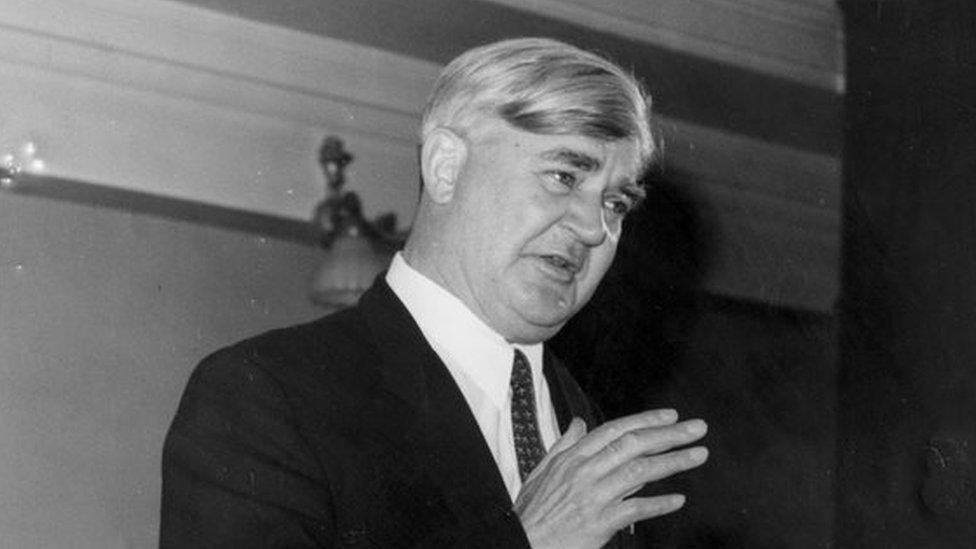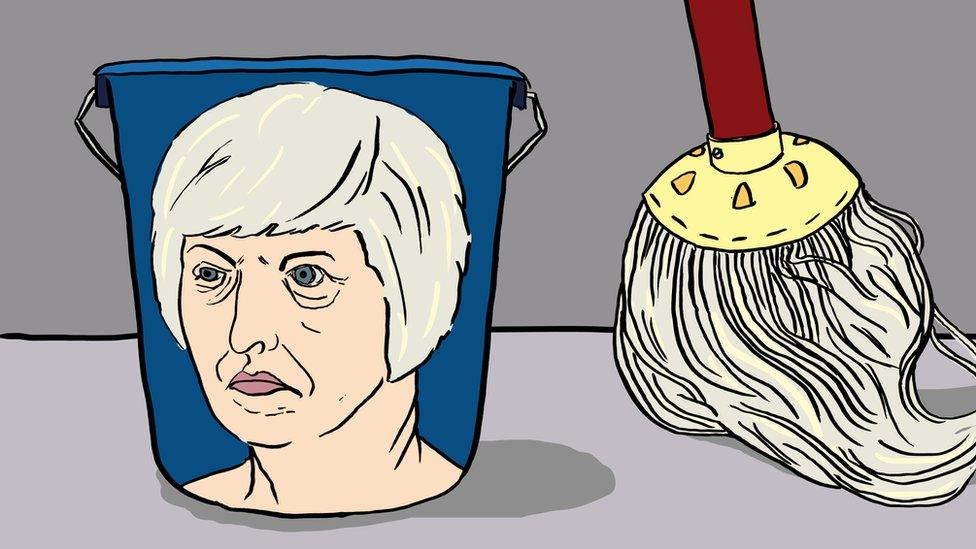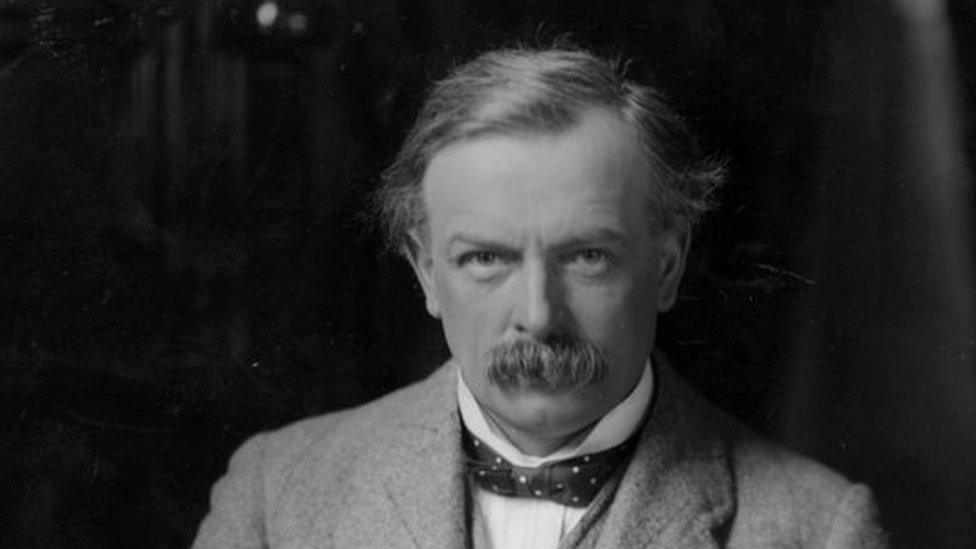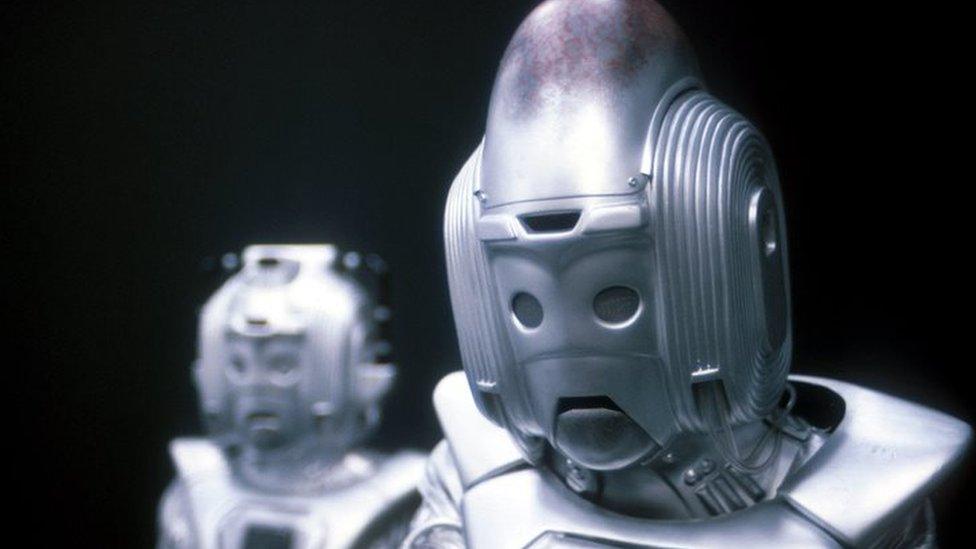Election Lexicon: Glumbuckets, nudity and Star Trek training
- Published

Nye Bevan didn't want to be "naked" in the conference chamber
Every general election throws up buzzwords and curiosities which help to define the tenor of the campaign. Which words have caught the ear in the past week?
Naked in the chamber
When Theresa May asked a Wolverhampton audience to imagine Jeremy Corbyn as prime minister "alone and naked in the negotiating chamber" with the European Union, the Labour leader was quick to respond:, external "It's totally inappropriate to describe anyone as naked - even me."
Naked in the chamber is, however, very much a Labour party phrase. To find its origin, we have to flash back to secret cabinet committee meetings of the mid-1940s, when Labour PM Clement Attlee committed Britain to the atomic bomb.
"We've got to have this thing over here, whatever it costs," urged Foreign Secretary Ernest Bevin.
As now, not everyone agreed. But in 1957, shadow foreign secretary Nye Bevan insisted that you couldn't persuade other countries to abandon weapons of mass destruction if you had already unilaterally disarmed.
Or, in his words delivered to Labour conference in the resonant vowels of the South Wales Valleys, you could stand no chance of "getting the damn thing destroyed" if you were sent "naked into the conference chamber".
So, to continue the language of nudity, Theresa May's quote works on one level for politics buffs and on another, starker, level for everyone else.
And it is of course purely metaphorical. The EU advises: "There is no particular dress code. Please make sure, however, that whatever you wear is neat and clean."
Glumbucket

The other of the week's most memorable slights, external also has political pedigree. At a London rally, Theresa May took a question from the Daily Mail's Quentin Letts.
"I don't mean to be rude," he said, a caveat which is never followed by anything that is not rude, "but you seem to be a bit of a glumbucket."

Lloyd George - the original gloom bucket?
It feels like the kind of description that is only possible in today's confrontational politics, but back in the so-called age of deference, the former Liberal Prime Minister David Lloyd George was described as "the most startling gloom bucket in the world just now" though that was at the safer distance afforded by the New York Times., external
Did Quentin Letts have this earlier phrase, external in mind? Probably not. People have, since the 1980s, enjoyed making up daft words with "bucket" at the end: fussbucket, gutbucket and so on. A brief scan of the user-generated Urban Dictionary indeed reveals a wealth of "-bucket" neologisms, very few of them complimentary and even fewer mentionable on the BBC.
Incidentally, what earned Lloyd George the "gloom bucket" tag was his belief that the Europe of the 1920s was "heading rapidly for chaos"; perhaps subsequent events suggest that neither "gloom bucket" nor "glumbucket" is as insulting as it appears. On which topic...
Brexit
From the get-go, Brexit was a shoo-in for last year's editions of those "word of the year" awards that dictionaries enjoy compiling around Christmas. But before Brexit, there was Grexit: the hypothetical withdrawal of Greece from the Eurozone.
Soon after, the wheeze of cannibalising the start of the name of a country with "exit" gained common currency, especially in countries with a common currency and so economists and politicians contemplated Frexit, Nexit and 16 other varieties.
The UK's version - originally the spikier "Brixit" in a 2012 piece in the Economist, external - used to come adorned with inverted commas, reflecting that it referred to a thought experiment or imaginary future.
Now it doesn't need quote marks, as everyone knows just what it means. Or rather, while "Grexit" referred only to coming out of the euro, nobody agrees on what "Brexit" means, which is why we use the word so much.
Hung parliament
Some recent polling has shown the blue and red wiggly lines tentatively approaching each other, leading to the reappearance of the words which dominated the 2015 campaign: hung parliament. It's a curious and unpleasant phrase, and feels like it's probably been around since the days when actual hangings provided an evening's entertainment for a family.
In fact, even the prodigiously hung parliament of February 1974 (Con 297; Lab: 301) was described at the time using imagery from chess ("stalemate") or, well, lock-making ("deadlock"). During that short-lived Wilson government, the Guardian's Simon Hoggart borrowed a term from the courtroom (a hung jury being one left hanging and unable to deliver a verdict).
The phrase stuck, but it doesn't quite work. A hung jury, after all, is typically sent away and replaced with a new collection of people. The analogy holds for 1974, and indeed for 1910, where a new election followed the same year. But it doesn't quite work for, say, 2010. Perhaps we should consider David Owen's preferred, and less ominous, term "a negotiating Parliament, external"?
Kobayashi Maru

Captain Kirk defeated the Kobayashi Maru test
Finally, some other interesting pieces of language from the penultimate week of the campaign. In the BBC's Electioncast podcast, Chris Cook said that a Lib Dem aide described this election as the party's Kobayashi Maru. For those unacquainted with Star Trek, this is a military training exercise where cadets are confronted with a situation where taking action will result in their own annihilation. At least the geekier wing of the party is maintaining a sense of humour.
And SNP MSP John Mason has drawn criticism for asking whether surgeons need to be able to spell.
Election Lexicon assumes most readers would rather their surgeons knew their gluteal adipose from their cubitus.
And it might be worth remembering that the SNP's chief executive was very quick to criticise the BBC, external for a very minor spelling mistake last year - so we await clarification on the party's official policy on the matter.
- Published20 May 2017
